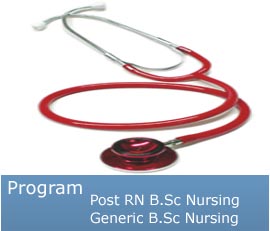|
General
Nursing Program |
|
The Jinnah College of Nursing Karachi proudly annouces admission in the
following evening degree programs: |
 |
-
Post RN B.Sc Nursing (02 Years)
-
Generic B.Sc Nursing (04 Years)
|
|
The B.ScN Program begins in April 2009 with students from all over the Country.
In this regard, there are two degree programs, one is Generic B.ScN of 04 years
& other is Post RN B.ScN of 02 years. In addition to the degree programs, there
are postgraduate Diploma Programs in different disciplines. The four year
program is leading to eligibility for licensure as a Registered Nurse (RN) and
simultaneously attainment of a Bachelor's Degree in Nursing. Both these programs
consolidate the foundation of knowledge, skill and attitude needed to practice
nursing and is designed to prepare clinically competent professional nurses.
|
|
|
|
Upon graduation, students will be able to demonstrate responsibility and
accountability to the nursing profession by: |
-
Adhering to established patterns of professional practices, which support legal,
religious, and ethical tenants of Pakistan;
-
Utilizing the nursing process to provide safe, competent, and holistic nursing
care to patients/clients in a variety of settings;
-
Utilizing effective critical thinking and problem solving in caring for the
individual, family and community;
-
Utilizing scholarly skills and the use of scientific methods in critiquing and
applying existing nursing theories and research findings in selected practice
settings;
-
Utilizing effective oral and written communications in interpersonal and
professional interactions with peers, clients, families, and other
professionals;
-
Demonstrating excellent human resource for teaching, research, administration,
management & leadership roles.
-
Demonstrating a high degree of competence in the use of available resources to
support the identified needs of communities, families and individuals;
-
Demonstrating the ability to coordinate activities related to the provision of
health care for individuals, families and groups of patients / clients in
various settings and provide leadership as appropriate;
-
Developing attitudes and socio-political skills to influence individuals,
families, and communities to mobilize financial resources to meet identified
health needs;
-
Demonstrating awareness of the existing health care system and its policies as
they affect patient/client care;
-
Developing leadership skills to promote development of the profession.
|
|
Purpose |
|
The role of the professional nurse continues to encompass three broad areas. |
-
Provider of direct and indirect care to individuals, families, groups,
communities, and population.
-
Designer, manager, and coordinator of care.
-
Member of a profession.
|
|
Program Objectives |
|
To implement the role of a professional nurse which includes providing care for
individuals, families, groups, and communities.The graduate will be able to: |
-
Integrate theory from nursing arts, humanities, and sciences to provide
culturally sensitive care in the global community.
-
Apply the nursing process using critical thinking, communication, assessment,
and technical skills.
-
Collaborate with clients and other members of the inter disciplinary health care
team for ealth promotion, risk reduction, disease prevention, disease
management, and health restoration.
-
Utilize information and health care technologies in nursing practice.
-
Integrate research findings to promote evidence based nursing practice.
-
Incorporate knowledge of economic, legal, ethical, and political factors
influencing health care systems and policy to advocate for recipients of nursing
care.
-
Apply principles of leadership to design, manage, coordinate, and evaluate
health care delivery.
-
Demonstrate professional nursing standards, values, and accountability.
-
Assume responsibility for professional development and lifelong learning.
|
|
|
|
|